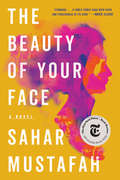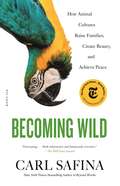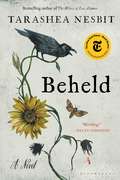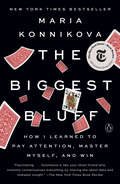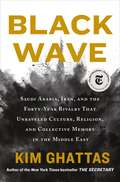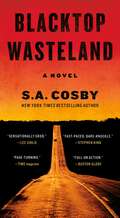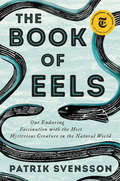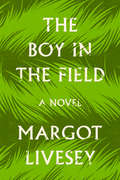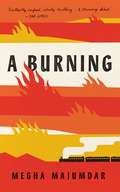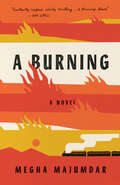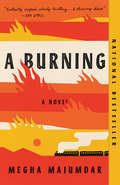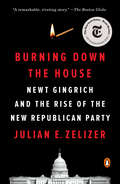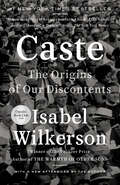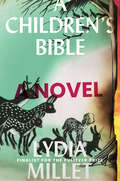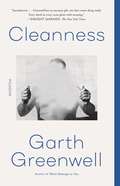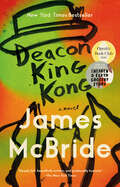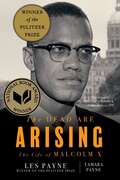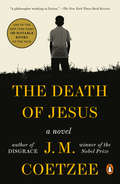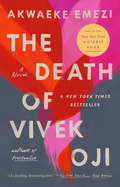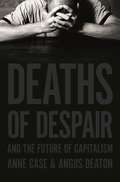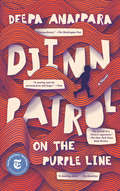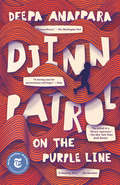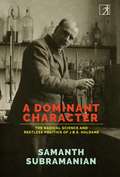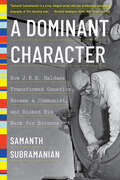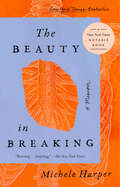Special Collections
100 Notable Books of 2020
- Table View
- List View
The Beauty of Your Face
by Sahar MustafahNamed a Most Anticipated Book of 2020 by Marie Claire, Bustle, Real Simple, and Literary Hub A Palestinian American woman wrestles with faith, loss, and identity before coming face-to-face with a school shooter in this searing debut. A uniquely American story told in powerful, evocative prose, The Beauty of Your Face navigates a country growing ever more divided. Afaf Rahman, the daughter of Palestinian immigrants, is the principal of Nurrideen School for Girls, a Muslim school in the Chicago suburbs. One morning, a shooter—radicalized by the online alt-right—attacks the school. As Afaf listens to his terrifying progress, we are swept back through her memories: the bigotry she faced as a child, her mother’s dreams of returning to Palestine, and the devastating disappearance of her older sister that tore her family apart. Still, there is the sweetness of the music from her father’s oud, and the hope and community Afaf finally finds in Islam. The Beauty of Your Face is a profound and poignant exploration of one woman’s life in a nation at odds with its ideals, an emotionally rich novel that encourages us to reflect on our shared humanity. If others take the time to really see us, to look into our face, they will find something indelibly familiar, something achingly beautiful gazing back.
Becoming Wild
by Carl SafinaNew York Times bestselling author Carl Safina brings readers close to three non-human cultures—what they do, why they do it, and how life is for them.Some people insist that culture is strictly a human feat. What are they afraid of? This book looks into three cultures of other-than-human beings in some of Earth’s remaining wild places. It shows how if you’re a sperm whale, a scarlet macaw, or a chimpanzee, you too experience your life with the understanding that you are an individual in a particular community. You too are who you are not by genes alone; your culture is a second form of inheritance. You receive it from thousands of individuals, from pools of knowledge passing through generations like an eternal torch. You too may raise young, know beauty, or struggle to negotiate a peace. And your culture, too, changes and evolves. The light of knowledge needs adjusting as situations change, so a capacity for learning, especially social learning, allows behaviors to adjust, to change much faster than genes alone could adapt. Becoming Wild offers a glimpse into cultures among non-human animals through looks at the lives of individuals in different present-day animal societies. By showing how others teach and learn, Safina offers a fresh understanding of what is constantly going on beyond humanity. With reporting from deep in nature, alongside individual creatures in their free-living communities, this book offers a very privileged glimpse behind the curtain of life on Earth, and helps inform the answer to that most urgent of questions: Who are we here with?
Beheld
by TaraShea NesbitMost Anticipated Books of 2020 - Vogue, Medium, LitHubFrom the bestselling author of The Wives of Los Alamos comes the riveting story of a stranger's arrival in the fledgling colony of Plymouth, Massachusetts-and a crime that shakes the divided community to its core. Ten years after the Mayflower pilgrims arrived on rocky, unfamiliar soil, Plymouth is not the land its residents had imagined. Seemingly established on a dream of religious freedom, in reality the town is led by fervent puritans who prohibit the residents from living, trading, and worshipping as they choose. By the time an unfamiliar ship, bearing new colonists, appears on the horizon one summer morning, Anglican outsiders have had enough. With gripping, immersive details and exquisite prose, TaraShea Nesbit reframes the story of the pilgrims in the previously unheard voices of two women of very different status and means. She evokes a vivid, ominous Plymouth, populated by famous and unknown characters alike, each with conflicting desires and questionable behavior. Suspenseful and beautifully wrought, Beheld is about a murder and a trial, and the motivations-personal and political-that cause people to act in unsavory ways. It is also an intimate portrait of love, motherhood, and friendship that asks: Whose stories get told over time, who gets believed-and subsequently, who gets punished?
The Biggest Bluff
by Maria KonnikovaHow a New York Times bestselling author and New Yorker contributor parlayed a strong grasp of the science of human decision-making and a woeful ignorance of cards into a life-changing run as a professional poker player, under the wing of a legend of the gameIt's true that Maria Konnikova had never actually played poker before and didn't even know the rules when she approached Erik Seidel, Poker Hall of Fame inductee and winner of tens of millions of dollars in earnings, and convinced him to be her mentor. But she knew her man: a famously thoughtful and broad-minded player, he was intrigued by her pitch that she wasn't interested in making money so much as learning about life. She had faced a stretch of personal bad luck, and her reflections on the role of chance had led her to a giant of game theory, who pointed her to poker as the ultimate master class in learning to distinguish between what can be controlled and what can't. And she certainly brought something to the table, including a Ph.D. in psychology and an acclaimed and growing body of work on human behavior and how to hack it. So Seidel was in, and soon she was down the rabbit hole with him, into the wild, fiercely competitive, overwhelmingly masculine world of high-stakes Texas Hold'em, their initial end point the following year's World Series of Poker.But then something extraordinary happened. Under Seidel's guidance, Konnikova did have many epiphanies about life that derived from her new pursuit, including how to better read, not just her opponents but far more importantly herself; how to identify what tilted her into an emotional state that got in the way of good decisions; and how to get to a place where she could accept luck for what it was, and what it wasn't. But she also began to win. And win. In a little over a year, she began making earnest money from tournaments, ultimately totaling hundreds of thousands of dollars. She won a major title, got a sponsor, and got used to being on television, and to headlines like "How one writer's book deal turned her into a professional poker player." She even learned to like Las Vegas.But in the end, Maria Konnikova is a writer and student of human behavior, and ultimately the point was to render her incredible journey into a container for its invaluable lessons. The biggest bluff of all, she learned, is that skill is enough. Bad cards will come our way, but keeping our focus on how we play them and not on the outcome will keep us moving through many a dark patch, until the luck once again breaks our way.
Black Wave
by Kim Ghattas“[A] sweeping and authoritative history" (The New York Times Book Review), Black Wave is an electrifying and audacious narrative examination of how the modern Middle East unraveled and why it started with the pivotal year of 1979. Kim Ghattas seamlessly weaves together history, geopolitics, and culture to deliver a gripping read of the largely unexplored story of the rivalry between between Saudi Arabia and Iran, born from the sparks of the 1979 Iranian revolution and fueled by American policy. With vivid story-telling, extensive historical research and on-the-ground reporting, Ghattas dispels accepted truths about a region she calls home. She explores how Sunni Saudi Arabia and Shia Iran, once allies and twin pillars of US strategy in the region, became mortal enemies after 1979. She shows how they used and distorted religion in a competition that went well beyond geopolitics. Feeding intolerance, suppressing cultural expression, and encouraging sectarian violence from Egypt to Pakistan, the war for cultural supremacy led to Iran’s fatwa against author Salman Rushdie, the assassination of countless intellectuals, the birth of groups like Hezbollah in Lebanon, the September 11th terrorist attacks, and the rise of ISIS.Ghattas introduces us to a riveting cast of characters whose lives were upended by the geopolitical drama over four decades: from the Pakistani television anchor who defied her country’s dictator, to the Egyptian novelist thrown in jail for indecent writings all the way to the murder of journalist Jamal Khashoggi in the Saudi consulate in Istanbul in 2018. Black Wave is both an intimate and sweeping history of the region and will significantly alter perceptions of the Middle East.
Blacktop Wasteland
by S. A. CosbyA husband, a father, a son, a business owner…And the best getaway driver east of the Mississippi.“Sensationally good—new, fresh, real, authentic, twisty, with characters and dilemmas that will break your heart. More than recommended.” —Lee ChildBeauregard “Bug” Montage is an honest mechanic, a loving husband, and a hard-working dad. Bug knows there’s no future in the man he used to be: known from the hills of North Carolina to the beaches of Florida as the best wheelman on the East Coast.He thought he'd left all that behind him, but as his carefully built new life begins to crumble, he finds himself drawn inexorably back into a world of blood and bullets. When a smooth-talking former associate comes calling with a can't-miss jewelry store heist, Bug feels he has no choice but to get back in the driver's seat. And Bug is at his best where the scent of gasoline mixes with the smell of fear.Haunted by the ghost of who he used to be and the father who disappeared when he needed him most, Bug must find a way to navigate this blacktop wasteland...or die trying.Like Ocean’s Eleven meets Drive, with a Southern noir twist, S. A. Cosby’s Blacktop Wasteland is a searing, operatic story of a man pushed to his limits by poverty, race, and his own former life of crime.
The Book of Eels
by Patrik SvenssonPart H Is for Hawk, part The Soul of an Octopus, The Book of Eels is both a meditation on the world’s most elusive fish—the eel—and a reflection on the human conditionRemarkably little is known about the European eel, Anguilla anguilla. So little, in fact, that scientists and philosophers have, for centuries, been obsessed with what has become known as the “eel question”: Where do eels come from? What are they? Are they fish or some other kind of creature altogether? Even today, in an age of advanced science, no one has ever seen eels mating or giving birth, and we still don’t understand what drives them, after living for decades in freshwater, to swim great distances back to the ocean at the end of their lives. They remain a mystery.Drawing on a breadth of research about eels in literature, history, and modern marine biology, as well as his own experience fishing for eels with his father, Patrik Svensson crafts a mesmerizing portrait of an unusual, utterly misunderstood, and completely captivating animal. In The Book of Eels, we meet renowned historical thinkers, from Aristotle to Sigmund Freud to Rachel Carson, for whom the eel was a singular obsession. And we meet the scientists who spearheaded the search for the eel’s point of origin, including Danish marine biologist Johannes Schmidt, who led research efforts in the early twentieth century, catching thousands upon thousands of eels, in the hopes of proving their birthing grounds in the Sargasso Sea.Blending memoir and nature writing at its best, Svensson’s journey to understand the eel becomes an exploration of the human condition that delves into overarching issues about our roots and destiny, both as humans and as animals, and, ultimately, how to handle the biggest question of all: death. The result is a gripping and slippery narrative that will surprise and enchant.
The Boy in the Field
by Margot LiveseyA New York Times Notable Book of the Year | An O Magazine Best Book of the YearThe New York Times bestselling author of The Flight of Gemma Hardy delivers another “luminous, unforgettable, and perfectly rendered” (Dennis Lehane) novel—a poignant and probing psychological drama that follows the lives of three siblings in the wake of a violent crime.One September afternoon in 1999, teenagers Matthew, Zoe, and Duncan Lang are walking home from school when they discover a boy lying in a field, bloody and unconscious. Thanks to their intervention, the boy’s life is saved. In the aftermath, all three siblings are irrevocably changed. Matthew, the oldest, becomes obsessed with tracking down the assailant, secretly searching the local town with the victim’s brother. Zoe wanders the streets of Oxford, looking at men, and one of them, a visiting American graduate student, looks back. Duncan, the youngest, who has seldom thought about being adopted, suddenly decides he wants to find his birth mother. Overshadowing all three is the awareness that something is amiss in their parents’ marriage. Over the course of the autumn, as each of the siblings confronts the complications and contradictions of their approaching adulthood, they find themselves at once drawn together and driven apart.Written with the deceptive simplicity and power of a fable, The Boy in the Field showcases Margot Livesey’s unmatched ability to “tell her tale masterfully, with intelligence, tenderness, and a shrewd understanding of all our mercurial human impulses” (Lily King, author of Euphoria).
A Burning
by Megha MajumdarA girl walks through the slums of Kolkata holding an armful of books. She returns home smelling of smoke, and checks her most prized possession: a brand-new smartphone, purchased in instalments. On Facebook, there is only one conversation. #KolabaganTrainAttack On the small, glowing screen, she types a dangerous thing… &‘If the police didn&’t help ordinary people like you and me, if the police watched them die, doesn&’t that mean that the government is also a terrorist?&’ Set in contemporary India, A Burning is the story of three unforgettable characters, all dreaming of a better future, whose lives are changed for ever when they become caught up in the devastating aftermath of a terrorist attack. Jivan – a poor, young, Muslim girl, who dreams of going to college – faces a possible death sentence after being accused of collaborating with the terrorists. Lovely – an exuberant hijra who longs to be a Bollywood star – holds the alibi that can set Jivan free, but telling the truth will cost her everything she holds dear. PT Sir – an opportunistic gym teacher who once taught Jivan – becomes involved with Hindu nationalist politics and his own ascent is soon inextricably linked to Jivan&’s fall. Taut, propulsive and electrifying, from its opening lines to its astonishing finale, A Burning confronts issues of class, fate, prejudice and corruption with a Dickensian sense of injustice, and asks us to consider what it means to nurture big ambitions in a country hurtling towards political extremism.ABurning is a novel for our times and for all time.
A Burning
by Megha MajumdarFor readers of Tommy Orange, Yaa Gyasi, and Jhumpa Lahiri, an electrifying debut novel about three unforgettable characters who seek to rise--to the middle class, to politcal power, to fame in the movies--and find their lives entangled in the wake of a catastrophe in contemporary India.Jivan is a Muslim girl from the slums, determined to move up in life, who is accused of executing a terrorist attack on a train because of a careless comment on Facebook. PT Sir is an opportunistic gym teacher who hitches his aspirations to a right-wing political party, and finds that his own ascent becomes linked to Jivan's fall. Lovely--an irresistible outcast whose exuberant voice and dreams of glory fill the novel with warmth and hope and humour--has the alibi that can set Jivan free, but it will cost her everything she holds dear. Taut, symphonic, propulsive, and riveting from its opening lines, A Burning has the force of an epic while being so masterfully compressed it can be read in a single sitting. Majumdar writes with dazzling assurance at a breakneck pace on complex themes that read here as the components of a thriller: class, fate, corruption, justice, and what it feels like to face profound obstacles and yet nurture big dreams in a country spinning toward extremism. An extraordinary debut. A novel about fate, power, opportunity, and class; about innocence and guilt, betrayal and love, and the corrosive media cycle that manufactures falsehoods masquerading as truths--A Burning is a debut novel of exceptional power and urgency, haunting and beautiful, brutal, vibrant, impossible to forget.
A Burning
by Megha MajumdarFor readers of Tommy Orange, Yaa Gyasi, and Jhumpa Lahiri, an electrifying debut novel about three unforgettable characters who seek to rise--to the middle class, to political power, to fame in the movies--and find their lives entangled in the wake of a catastrophe in contemporary India.
Jivan is a Muslim girl from the slums, determined to move up in life, who is accused of executing a terrorist attack on a train because of a careless comment on Facebook. PT Sir is an opportunistic gym teacher who hitches his aspirations to a right-wing political party, and finds that his own ascent becomes linked to Jivan's fall. Lovely--an irresistible outcast whose exuberant voice and dreams of glory fill the novel with warmth and hope and humor--has the alibi that can set Jivan free, but it will cost her everything she holds dear.
Taut, symphonic, propulsive, and riveting from its opening lines, A Burning has the force of an epic while being so masterfully compressed it can be read in a single sitting. Majumdar writes with dazzling assurance at a breakneck pace on complex themes that read here as the components of a thriller: class, fate, corruption, justice, and what it feels like to face profound obstacles and yet nurture big dreams in a country spinning toward extremism. An extraordinary debut.
Burning Down the House
by Julian E. ZelizerThe story of how Newt Gingrich and his allies tainted American politics, launching an enduring era of brutal partisan warfare When Donald Trump was elected president in 2016, President Obama observed that Trump &“is not an outlier; he is a culmination, a logical conclusion of the rhetoric and tactics of the Republican Party.&” In Burning Down the House, historian Julian Zelizer pinpoints the moment when our country was set on a path toward an era of bitterly partisan and ruthless politics, an era that was ignited by Newt Gingrich and his allies. In 1989, Gingrich brought down Democratic Speaker of the House Jim Wright and catapulted himself into the national spotlight. Perhaps more than any other politician, Gingrich introduced the rhetoric and tactics that have shaped Congress and the Republican Party for the last three decades. Elected to Congress in 1978, Gingrich quickly became one of the most powerful figures in America not through innovative ideas or charisma, but through a calculated campaign of attacks against political opponents, casting himself as a savior in a fight of good versus evil. Taking office in the post-Watergate era, he weaponized the good government reforms newly introduced to fight corruption, wielding the rules in ways that shocked the legislators who had created them. His crusade against Democrats culminated in the plot to destroy the political career of Speaker Wright. While some of Gingrich&’s fellow Republicans were disturbed by the viciousness of his attacks, party leaders enjoyed his successes so much that they did little collectively to stand in his way. Democrats, for their part, were alarmed, but did not want to sink to his level and took no effective actions to stop him. It didn&’t seem to matter that Gingrich&’s moral conservatism was hypocritical or that his methods were brazen, his accusations of corruption permanently tarnished his opponents. This brand of warfare worked, not as a strategy for governance but as a path to power, and what Gingrich planted, his fellow Republicans reaped. He led them to their first majority in Congress in decades, and his legacy extends far beyond his tenure in office. From the Contract with America to the rise of the Tea Party and the Trump presidential campaign, his fingerprints can be seen throughout some of the most divisive episodes in contemporary American politics. Burning Down the House presents the alarming narrative of how Gingrich and his allies created a new normal in Washington.
Caste
by Isabel WilkersonIn this brilliant book, Isabel Wilkerson gives us a masterful portrait of an unseen phenomenon in America as she explores, through an immersive, deeply researched narrative and stories about real people, how America today and throughout its history has been shaped by a hidden caste system, a rigid hierarchy of human rankings.
Beyond race, class, or other factors, there is a powerful caste system that influences people’s lives and behavior and the nation’s fate. Linking the caste systems of America, India, and Nazi Germany, Wilkerson explores eight pillars that underlie caste systems across civilizations, including divine will, bloodlines, stigma, and more. Using riveting stories about people—including Martin Luther King, Jr., baseball’s Satchel Paige, a single father and his toddler son, Wilkerson herself, and many others—she shows the ways that the insidious undertow of caste is experienced every day. She documents how the Nazis studied the racial systems in America to plan their out-cast of the Jews; she discusses why the cruel logic of caste requires that there be a bottom rung for those in the middle to measure themselves against; she writes about the surprising health costs of caste, in depression and life expectancy, and the effects of this hierarchy on our culture and politics. Finally, she points forward to ways America can move beyond the artificial and destructive separations of human divisions, toward hope in our common humanity.
Beautifully written, original, and revealing, Caste: The Origins of Our Discontents is an eye-opening story of people and history, and a reexamination of what lies under the surface of ordinary lives and of American life today.
A New York Times bestseller
A Children's Bible
by Lydia MilletNamed a Most Anticipated Book of 2020 by Apple Books, Literary Hub, The Millions, and The Week An indelible novel of teenage alienation and adult complacency in an unraveling world. Pulitzer Prize finalist Lydia Millet’s sublime new novel—her first since the National Book Award long-listed Sweet Lamb of Heaven—follows a group of twelve eerily mature children on a forced vacation with their families at a sprawling lakeside mansion. Contemptuous of their parents, who pass their days in a stupor of liquor, drugs, and sex, the children feel neglected and suffocated at the same time. When a destructive storm descends on the summer estate, the group’s ringleaders—including Eve, who narrates the story—decide to run away, leading the younger ones on a dangerous foray into the apocalyptic chaos outside. As the scenes of devastation begin to mimic events in the dog-eared picture Bible carried around by her beloved little brother, Eve devotes herself to keeping him safe from harm. A Children’s Bible is a prophetic, heartbreaking story of generational divide—and a haunting vision of what awaits us on the far side of Revelation.
Cleanness
by Garth GreenwellIn the highly anticipated follow-up to his beloved debut, What Belongs to You, Garth Greenwell deepens his exploration of foreignness, obligation, and desireSofia, Bulgaria, a landlocked city in southern Europe, stirs with hope and impending upheaval. Soviet buildings crumble, wind scatters sand from the far south, and political protesters flood the streets with song.In this atmosphere of disquiet, an American teacher navigates a life transformed by the discovery and loss of love. As he prepares to leave the place he’s come to call home, he grapples with the intimate encounters that have marked his years abroad, each bearing uncanny reminders of his past. A queer student’s confession recalls his own first love, a stranger’s seduction devolves into paternal sadism, and a romance with another foreigner opens, and heals, old wounds. Each echo reveals startling insights about what it means to seek connection: with those we love, with the places we inhabit, and with our own fugitive selves.Cleanness revisits and expands the world of Garth Greenwell’s beloved debut, What Belongs to You, declared “an instant classic” by The New York Times Book Review. In exacting, elegant prose, he transcribes the strange dialects of desire, cementing his stature as one of our most vital living writers.
Deacon King Kong
by James McBrideFrom James McBride, author of the National Book Award-winning The Good Lord Bird and the bestselling modern classic The Color of Water, one of the most anticipated novels of the year: a wise and witty tale about what happens to the witnesses of a shooting.
In September 1969, a fumbling, cranky old church deacon known as Sportcoat shuffles into the courtyard of the Cause Houses housing project in south Brooklyn, pulls a .38 from his pocket, and in front of everybody shoots the project's drug dealer at point-blank range.The reasons for this desperate burst of violence and the consequences that spring from it lie at the heart of Deacon King Kong, James McBride's funny, moving novel and his first since his National Book Award-winning The Good Lord Bird.
In Deacon King Kong, McBride brings to vivid life the people affected by the shooting: the victim, the African-American and Latinx residents who witnessed it, the white neighbors, the local cops assigned to investigate, the members of the Five Ends Baptist Church where Sportcoat was deacon, the neighborhood's Italian mobsters, and Sportcoat himself. As the story deepens, it becomes clear that the lives of the characters--caught in the tumultuous swirl of 1960s New York--overlap in unexpected ways.
When the truth does emerge, McBride shows us that not all secrets are meant to be hidden, that the best way to grow is to face change without fear, and that the seeds of love lie in hope and compassion.Bringing to these pages both his masterly storytelling skills and his abiding faith in humanity, James McBride has written a novel every bit as involving as The Good Lord Bird and as emotionally honest as The Color of Water. Told with insight and wit, Deacon King Kong demonstrates that love and faith live in all of us.
A New York Times Bestseller
The Dead Are Arising
by Les Payne and Tamara PayneAn epic, award-winning biography of Malcolm X that draws on hundreds of hours of personal interviews and rewrites much of the known narrative. Les Payne, the renowned Pulitzer Prize–winning investigative journalist, embarked in 1990 on a nearly thirty-year-long quest to create an unprecedented portrait of Malcolm X, one that would separate fact from fiction. The result is this historic, National Book Award–winning biography, which interweaves previously unknown details of Malcolm X’s life—from harrowing Depression-era vignettes to a moment-by-moment retelling of the 1965 assassination—into an extraordinary account that contextualizes Malcolm X’s life against the wider currents of American history. Bookended by essays from Tamara Payne, Payne’s daughter and primary researcher, who heroically completed the biography after her father’s death in 2018, The Dead Are Arising affirms the centrality of Malcolm X to the African American freedom struggle.
The Death of Jesus
by J. M. CoetzeeAfter The Childhood of Jesus and The Schooldays of Jesus, the Nobel prize-winning author completes his haunting trilogy with a new masterwork, The Death of JesusIn Estrella, David has grown to be a tall ten-year-old who is a natural at soccer, and loves kicking a ball around with his friends. His father Simón and Bolívar the dog usually watch while his mother Inés now works in a fashion boutique. David still asks many questions, challenging his parents, and any authority figure in his life. In dancing class at the Academy of Music he dances as he chooses. He refuses to do sums and will not read any books except Don Quixote.One day Julio Fabricante, the director of a nearby orphanage, invites David and his friends to form a proper soccer team. David decides he will leave Simón and Inés to live with Julio, but before long he succumbs to a mysterious illness. In The Death of Jesus, J. M. Coetzee continues to explore the meaning of a world empty of memory but brimming with questions.
The Death of Vivek Oji
by Akwaeke EmeziWhat does it mean for a family to lose a child they never really knew? One afternoon, in a town in southeastern Nigeria, a mother opens her front door to discover her son’s body, wrapped in colorful fabric, at her feet. What follows is the tumultuous, heart-wrenching story of one family’s struggle to understand a child whose spirit is both gentle and mysterious.
Raised by a distant father and an understanding but overprotective mother, Vivek suffers disorienting blackouts, moments of disconnection between self and surroundings. As adolescence gives way to adulthood, Vivek finds solace in friendships with the warm, boisterous daughters of the Nigerwives, foreign-born women married to Nigerian men. But Vivek’s closest bond is with Osita, the worldly, high-spirited cousin whose teasing confidence masks a guarded private life.
As their relationship deepens—and Osita struggles to understand Vivek’s escalating crisis—the mystery gives way to a heart-stopping act of violence in a moment of exhilarating freedom. Propulsively readable, teeming with unforgettable characters, The Death of Vivek Oji is a novel of family and friendship that challenges expectations—a dramatic story of loss and transcendence that will move every reader.
A New York Times bestseller
Deaths of Despair and the Future of Capitalism
by Anne Case and Angus DeatonFrom economist Anne Case and Nobel Prize winner Angus Deaton, a groundbreaking account of how the flaws in capitalism are fatal for America's working classLife expectancy in the United States has recently fallen for three years in a row—a reversal not seen since 1918 or in any other wealthy nation in modern times. In the past two decades, deaths of despair from suicide, drug overdose, and alcoholism have risen dramatically, and now claim hundreds of thousands of American lives each year—and they're still rising. Anne Case and Angus Deaton, known for first sounding the alarm about deaths of despair, explain the overwhelming surge in these deaths and shed light on the social and economic forces that are making life harder for the working class. They demonstrate why, for those who used to prosper in America, capitalism is no longer delivering.Deaths of Despair and the Future of Capitalism paints a troubling portrait of the American dream in decline. For the white working class, today's America has become a land of broken families and few prospects. As the college educated become healthier and wealthier, adults without a degree are literally dying from pain and despair. In this critically important book, Case and Deaton tie the crisis to the weakening position of labor, the growing power of corporations, and, above all, to a rapacious health-care sector that redistributes working-class wages into the pockets of the wealthy. Capitalism, which over two centuries lifted countless people out of poverty, is now destroying the lives of blue-collar America.This book charts a way forward, providing solutions that can rein in capitalism’s excesses and make it work for everyone.
Djinn Patrol on the Purple Line
by Deepa AnapparaIn this transporting debut novel, three friends venture into the most dangerous corners of a sprawling Indian city to find their missing classmate.Down market lanes crammed with too many people, dogs, and rickshaws, past stalls that smell of cardamom and sizzling oil, below a smoggy sky that doesn't let through a single blade of sunlight, and all the way at the end of the Purple metro line lies a jumble of tin-roofed homes where nine-year-old Jai lives with his family. From his doorway, he can spot the glittering lights of the city's fancy high-rises, and though his mother works as a maid in one, to him they seem a thousand miles away. Djinn Patrol on the Purple Line plunges readers deep into this neighbourhood to trace the unfolding of a tragedy through the eyes of a child as he has his first perilous collisions with an unjust and complicated wider world. Jai drools outside sweet shops, watches too many reality police shows, and considers himself to be smarter than his friends Pari (though she gets the best grades) and Faiz (though Faiz has an actual job). When a classmate goes missing, Jai decides to use the crime-solving skills he has picked up from TV to find him. He asks Pari and Faiz to be his assistants, and together they draw up lists of people to interview and places to visit. But what begins as a game turns sinister as other children start disappearing from their neighbourhood. Jai, Pari, and Faiz have to confront terrified parents, an indifferent police force, and rumours of soul-snatching djinns. As the disappearances edge ever close to home, the lives of Jai and his friends will never be the same again. Drawing on real incidents and a spate of disappearances in metropolitan India, Djinn Patrol on the Purple Line is extraordinarly moving, flawlessly imagined, and a triumph of suspense. It captures the fierce warmth, resilience, and bravery that can emerge in times of trouble and carries the reader headlong into a community that, once encountered, is impossible to forget.
Djinn Patrol on the Purple Line
by Deepa AnapparaIn a sprawling Indian city, three friends venture into the most dangerous corners to find their missing classmate. . . . Down market lanes crammed with too many people, dogs, and rickshaws, past stalls that smell of cardamom and sizzling oil, below a smoggy sky that doesn’t let through a single blade of sunlight, and all the way at the end of the Purple metro line lies a jumble of tin-roofed homes where nine-year-old Jai lives with his family.
From his doorway, he can spot the glittering lights of the city’s fancy high-rises, and though his mother works as a maid in one, to him they seem a thousand miles away. Djinn Patrol on the Purple Line plunges readers deep into this neighborhood to trace the unfolding of a tragedy through the eyes of a child as he has his first perilous collisions with an unjust and complicated wider world. Jai drools outside sweet shops, watches too many reality police shows, and considers himself to be smarter than his friends Pari (though she gets the best grades) and Faiz (though Faiz has an actual job).
When a classmate goes missing, Jai decides to use the crime-solving skills he has picked up from TV to find him. He asks Pari and Faiz to be his assistants, and together they draw up lists of people to interview and places to visit. But what begins as a game turns sinister as other children start disappearing from their neighborhood. Jai, Pari, and Faiz have to confront terrified parents, an indifferent police force, and rumors of soul-snatching djinns.
As the disappearances edge ever closer to home, the lives of Jai and his friends will never be the same again. Drawing on real incidents and a spate of disappearances in metropolitan India, Djinn Patrol on the Purple Line is extraordinarily moving, flawlessly imagined, and a triumph of suspense. It captures the fierce warmth, resilience, and bravery that can emerge in times of trouble and carries the reader headlong into a community that, once encountered, is impossible to forget.
A Dominant Character
by Samanth SubramanianJ.B.S. Haldane, scientist extraordinaire—born in Britain yet spiritually bound to India—remains one of the most enigmatic geniuses of the modern era. Here is a man who saw action in two world wars, engaged in the most radical politics of his day, conducted groundbreaking scientific research, and wrote with flair and conviction—yet Haldane&’s universe remains shrouded in mystery.
Award-winning author Samanth Subramanian’s latest offering undoes this travesty. Besides shedding light on Haldane’s contributions to genetics and evolutionary biology—he was the first to calculate the rate at which mutations occur and accumulate in genes—the book illuminates Haldane&’s inner world—his towering intellect, his radical vision of society, his provocative philosophy, and his attempts a wrestling with the essential moral questions that scientific progress must raise.
Equally, the book dwells on Haldane’s years in India—his journey to the nation; his affiliation with the Indian Statistical Institute, Calcutta; his attachment to the Genetics and Biometry Laboratory in Bhubaneshwar (where he died). Dronamraju’s description of Haldane as ‘the last man who knew everything’ was, at its simplest, an acknowledgement of his command over multiple subjects. But it was also an astute observation that Haldane’s era was the last time when the realms of scientific knowledge were limited enough for a single person to apprehend in near-entirety. To know everything was to see the forces of the world unified and to conceive of life in its full complexity. A Dominant Character will give readers a taste of that heady sensation.
A Dominant Character
by Samanth SubramanianA biography of J. B. S. Haldane, the brilliant and eccentric British scientist whose innovative predictions inspired Aldous Huxley’s Brave New World. J. B. S. Haldane’s life was rich and strange, never short on genius or drama—from his boyhood apprenticeship to his scientist father, who first instilled in him a devotion to the scientific method; to his time in the trenches during the First World War, where he wrote his first scientific paper; to his numerous experiments on himself, including inhaling dangerous levels of carbon dioxide and drinking hydrochloric acid; to his clandestine research for the British Admiralty during the Second World War. He is best remembered as a geneticist who revolutionized our understanding of evolution, but his peers hailed him as a polymath. One student called him “the last man who might know all there was to be known.” He foresaw in vitro fertilization, peak oil, and the hydrogen fuel cell, and his contributions ranged over physiology, genetics, evolutionary biology, mathematics, and biostatistics. He was also a staunch Communist, which led him to Spain during the Civil War and sparked suspicions that he was spying for the Soviets. He wrote copiously on science and politics in newspapers and magazines, and he gave speeches in town halls and on the radio—all of which made him, in his day, as famous in Britain as Einstein. It is the duty of scientists to think politically, Haldane believed, and he sought not simply to tell his readers what to think but to show them how to think. Beautifully written and richly detailed, Samanth Subramanian’s A Dominant Character recounts Haldane’s boisterous life and examines the questions he raised about the intersections of genetics and politics—questions that resonate even more urgently today.
The Beauty in Breaking
by Michele HarperAn emergency room physician explores how a life of service to others taught her how to heal herself.Michele Harper is a female, African American emergency room physician in a profession that is overwhelmingly male and white. Brought up in Washington, D.C., in a complicated family, she went to Harvard, where she met her husband. They stayed together through medical school until two months before she was scheduled to join the staff of a hospital in central Philadelphia, when he told her he couldn't move with her. Her marriage at an end, Harper began her new life in a new city, in a new job, as a newly single woman.In the ensuing years, as Harper learned to become an effective ER physician, bringing insight and empathy to every patient encounter, she came to understand that each of us is broken--physically, emotionally, psychically. How we recognize those breaks, how we try to mend them, and where we go from there are all crucial parts of the healing process. The Beauty in Breaking is the poignant true story of Harper's journey toward self-healing. Each of the patients Harper writes about taught her something important about recuperation and recovery. How to let go of fear even when the future is murky. How to tell the truth when it's simpler to overlook it. How to understand that compassion isn't the same as justice. As she shines a light on the systemic disenfranchisement of the patients she treats as they struggle to maintain their health and dignity, Harper comes to understand the importance of allowing ourselves to make peace with the past as we draw support from the present. In this hopeful, moving, and beautiful book, she passes along the precious, necessary lessons that she has learned as a daughter, a woman, and a physician.
